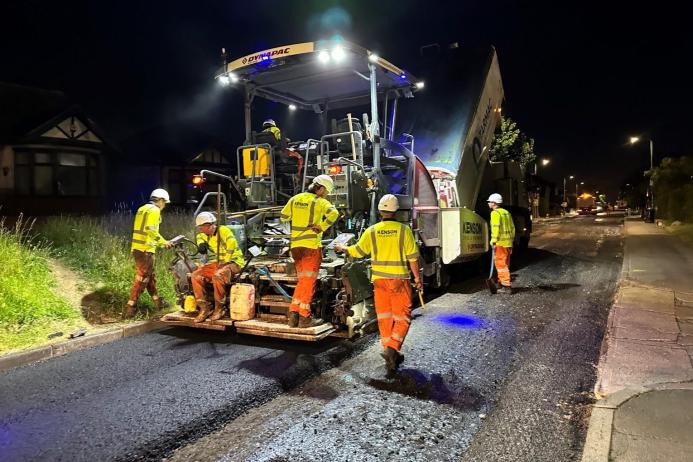Redbridge first in London to trial groundbreaking new asphalt
Tarmac-supplied asphalt mix significantly lowers carbon footprint by incorporating carbon-negative aggregate
A ROAD resurfacing scheme in London has used a new material that has enabled the city to lay asphalt with a significantly lower carbon footprint.
Redbridge Council in partnership with Kensons Highways have used a new type of asphalt for the resurfacing works at Lodge Hill Road in Redbridge. The asphalt mix supplied by Tarmac significantly lowers the project’s carbon footprint by incorporating a carbon-negative aggregate, named ACLA.
Every tonne of ACLA produced has permanently removed 748kg of CO2e from the atmosphere. ACLA was used for the resurfacing scheme’s binder course, which ensured the entire middle layer of the road was net zero, and significantly reduced the overall project’s carbon footprint.
The product was designed and manufactured by Earthshot Prize finalist climate tech company Low Carbon Materials (LCM). It works by sequestration, capturing and storing carbon dioxide to permanently remove it and locking it in the resulting road.
Using ACLA, Tarmac’s asphalt reduced the project’s carbon footprint by 68%, which was further enhanced by incorporating recycled asphalt planings (RAP) for a more circular approach.
Redbridge Council’s Cabinet Member for Environment and Sustainability, Cllr Jo Blackman, said: ‘Redbridge is always striving to find innovative ways to reduce emissions. We’re proud to be the first London borough to partner with Kensons, Low Carbon Materials, and Tarmac to deliver this pioneering new trial.
‘We are not only committed to improving the quality of our roads but also reducing the emissions associated with the resurfacing process. This trial is another step towards reducing our carbon footprint to become a cleaner and greener Redbridge.’
David Shelley, director of Kenson Highways, said: ‘We initially encountered Low Carbon Materials at the Highways UK show. Upon investigating the product, we quickly realized its potential interest for Redbridge. Our ongoing collaboration with Redbridge aims to identify methods to reduce carbon emissions, and this initiative represents one of several efforts to decrease emissions throughout the borough.’
Tim Smith, senior technical manager (South East) at Tarmac, added: ‘There has never been a more important time to explore innovative, carbon-saving solutions and materials. By collaborating with supply chain and industry partners on this project, we have demonstrated what’s possible in delivering greener roads. It is crucial that the learnings from this project help to inform further decarbonization of the road network.’
Natasha Boulding, chief executive officer of LCM, said: ‘I’m proud to have collaborated with pioneers Redbridge Council, Kensons Highways, and Tarmac on this first-of-its-kind scheme in London to see ACLA used to unlock net-zero asphalt. This project offers a blueprint for best practice and a clear roadmap for dramatically reducing the environmental impact of road construction and maintenance.’










